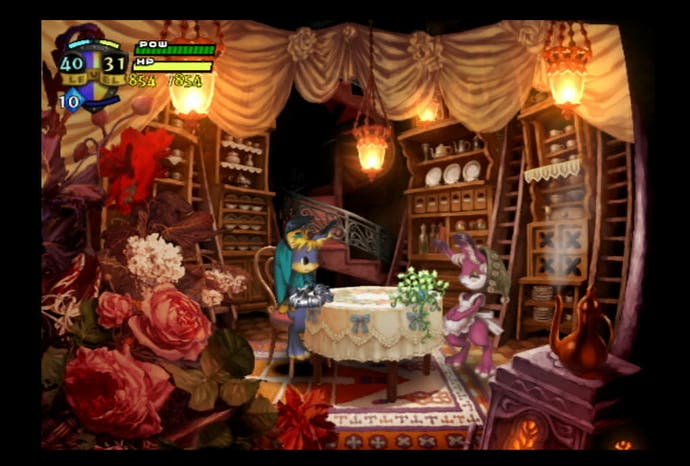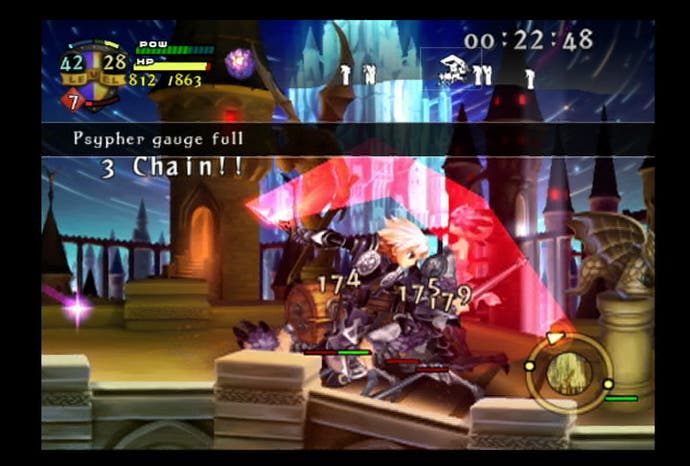Odin Sphere
Norses for courses.
To look into the world of Odin Sphere is to peer into an alternate present, a place where towering, razor-sharp 2D sprites are our stock videogame playthings. In this reality there is no place for the awkward, inexact realism of 3D objects no matter how well lit or posed they might be. Odin Sphere is instead the latest in a lineage of increasingly resplendent 2D masterpieces that never were - ripe fruit from a branch of the creative tree our world's developers absent-mindedly lopped off as soon as they discovered Mario 64's beguiling polygons.
Its 2D sprites, set upon a card deck of extraordinarily detailed parallax background layers, are arresting in their inventiveness, coherence and vision. A hunched king, crown brushing the top edge of your widescreen plasma, boots planted on the bottom, leers with almost Monty Python-esque animated poise. A snaking dragon, four screens long, lunges and recoils as if at a Chinese New Year carnival, spewing attacks at you like videogaming's monsters of yore except here repainted, reanimated and indescribably now.
Pause the game and the frozen image could be hung on your wall. Unpause the game and this is a moving artwork no amount of hyperbolic prose could repaint in words.
But while Odin Sphere's art team should be happily squished under an avalanche of awards and accolades, its design team are in need of a different kind of critical pressure. It will take a while, for some it might even be hours, but eventually you will grow used to this brave new façade and the contrasting conservatism of what lies beneath is revealed.
Primarily a scrolling beat-'em-up in the style of Treasure's classic Saturn game, Guardian Heroes, Odin Sphere evades being labelled a stupid button-mashing brawler by throwing in some cute atypical elements. RPG levelling of both characters and weapons together with a deep and complex item-synthesis sub-mechanic helps freshen an otherwise musty template. This hotchpotch of gaming styles is descended from another hallowed (Japanese-only) Saturn title, Princess Crown, a game with which it shares both parentage and inspiration. But while the resulting mixture is new to Western players it's still very recognisable and, in some ways, disappointingly derivative.

You take control of one of five different protagonists visiting various areas within the world of Erion in which the game is set. These areas are comprised of a series of Viewtiful Joe-style circular stages, each viewed side-on. In each stage you can run to the left or to the right and will eventually come back to where you started - they are all continuous loops. Your purpose is simple: find and defeat all of the enemies in each stage as quickly as possible (the quicker you are the better items you will receive), locate the door and proceed to the next. The final ring in the branching set will usually play host to a large boss upon whose defeat arrives the next narrative interlude.
The core beat-'em-up controls are straightforward. Offensive combos are triggered by hammering the square button and, when used in conjunction with the jump button, can be used to launch an aerial dive attack. Once killed, enemies give up a ghost that can be harvested to fill up your magic gauge. From this source various spells can be spoken to break up the monotony of the otherwise repetitive physical attacks. At the close of each stage you are given a ranking grade, much like an old school SNK fighter, and the better you've performed (in terms of the amount of damage received, time take and combos dealt) the better the items and weapons you'll receive.
The item synthesis/cookery section of the game proves increasingly important to your success in battles. Eating food not only replenishes life but, when imbued with the captured souls of enemies, also contributes exp to your character. By eating the right kinds of food it's possible to level up more quickly - something aided by discovering the game's various recipes. Using vials it's possible to mix and match various ingredients on the go and keeping a full supply of healing items in your item bags is mandatory to success. Initially you're only given very limited space and so you'll grow weary of the constant rearranging and dropping of the least important ones after each and every stage. Arguably this is designed to force you to keep using items rather than storing them but, even so, it's a time-consuming annoyance.

Unfortunately a slew of other mild irritations work to drain you of some of the evangelistic fervour the game inspires upon first touch. Serious slowdown spoils some of the more generously populated fights and stuttering load times between the short stages become an increasingly noticeable intrusion as the game progresses. It's impossible to skip through the text quickly and, perhaps most infuriatingly, the game's difficulty - achieved by simply throwing huge numbers of enemies your way while holding back key ingredients and items - becomes a grinding chore, especially after the first ten hours or so.
This is offset a little by the game's story, which, while lacking some of the vim promised by its presentation, still manages to drive you through. The script dodges cliché with every turn and is both thoughtful and compelling in its exploration of unusually tender themes for a game of such incessant violence. Atlus' increasingly brilliant localisation team playfully rework the Japanese script, and mature voice acting talent (switchable between Japanese and English) helps lift the story further. Likewise Hitoshi Sakimoto, the baton behind Final Fantasy Tactic's acclaimed score, has penned another exceptional soundtrack to underline both the action and drama.
Artistically Odin Sphere is one of the most marvellous videogames we've yet played. The inimitable character designs, varied and exquisite backgrounds, glorious soundtrack, considered voice acting and engaging storyline pull together in a consistent way few other games manage. However the game they clothe fails to engage in a similar way. While the immediacy of the action will grab all comers right from the off - the simplest of button inputs resulting in exciting explosions of action on-screen - the repetition, made worse by the game's difficulty and drawn out length, ensures that few who start on this adventure will ever finish it.


